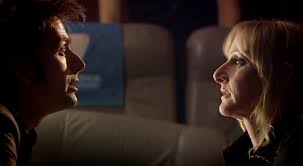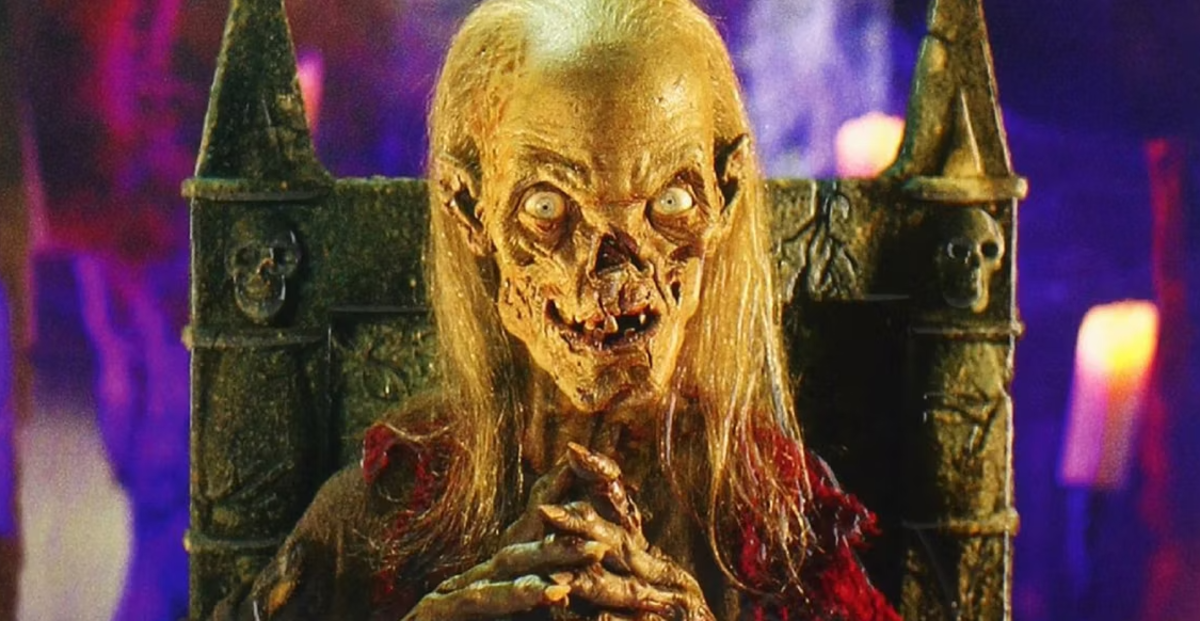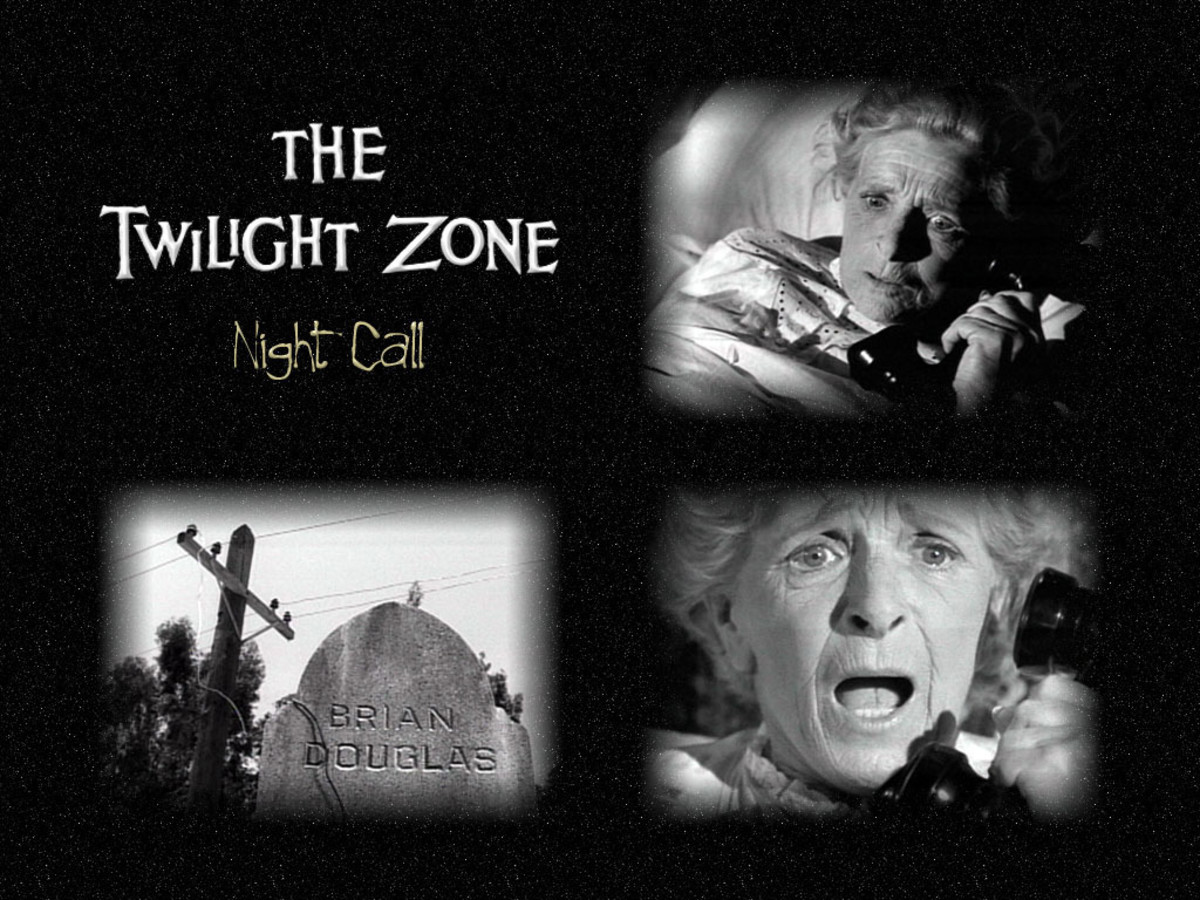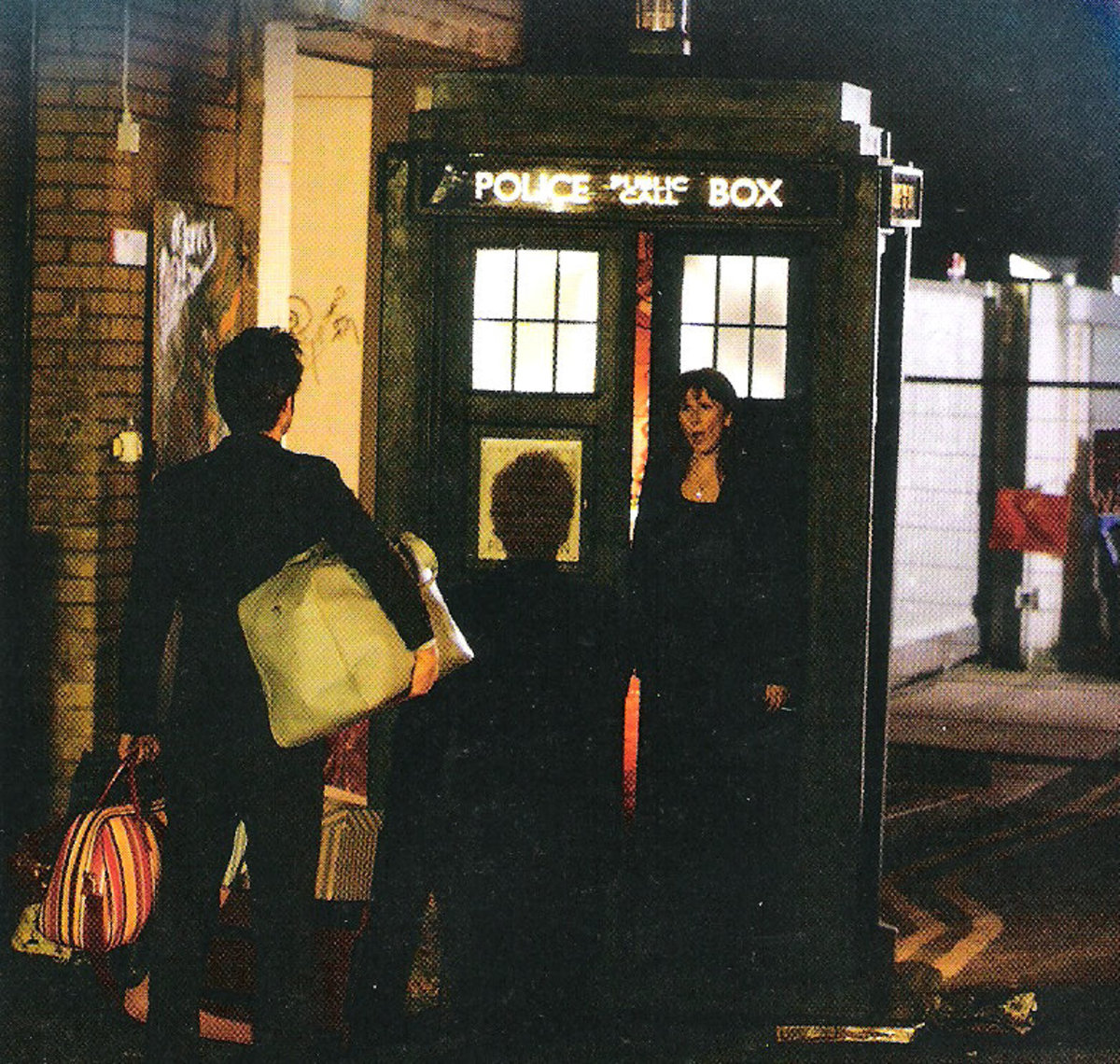Top Ten Jarring Doctor Who Episodes to Jump at This Halloween
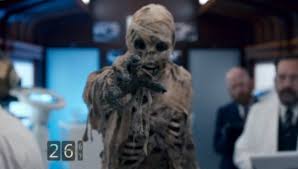
Doctor Who has been a perennially adored and beloved paragon coveted as a precious property for decades, since its inception at the humble beginnings of Sydney Newman and co's conceptual machinations in 1963. The studios of the BBC were ostensibly unaware of the prodigiously phenomenal product that they had stumbled upon at the time, and almost certainly had no idea of the monolithically magnificent fictional fantasy that the modest television programme they had created would become.
It was predominantly a science fiction show, designed initially to educate children and families of history via the vicarious experience of endeavours into the past, and of science when voyaging into a foray in the future. It struck a chord so resonantly and built an almost immediate rapport with raving audiences in their abundant droves-Touching the pulse of an emerging cultural zeitgeist of the sub-demographic of sci-fi "nerds", colloquially known as "Whovians". But what distinguishes Doctor Who among the plethora of contemporary peers as more than just a mediocre, run of the mill fantastical disarray is the spectacular ability it has to transcend genres and societal civilisations to entice even casual viewers from any background or nation on a global scale, with universal appeal.
One genre of televised tremendousness that it is not inextricably linked to, however, is the macabre genre of horror. But it certainly does share some ties to productions of the ilk of the sensational calibre of Signs, Alien, or Poltergeist; There is more than a satisfactory suffusion of the spooky aspects of the show, and with the occasion of Hallow's Eve at hand, a thrilling, functioning acknowledging assortment of fantastical, yet horrifying tales to be regaled and intimidated by from the marvellously innovative and enlightened minds responsible for the production of the wonderful space drama is in order, with the highest recommendations.
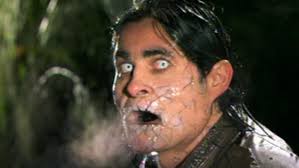
10. The Waters Of Mars
The Waters Of Mars was perhaps one of the most proficient episodes of television at taking all of its constituting components and consolidating them into a cohesive, consistent unit. It had a monumentally arduous task of telling an enticing and entertaining episode that took viewers on a voyage of a virtuous foray into the fundamental pillars of the sci-fi genre, while maintaining the refreshing appeal of the show while it defiantly remained prevalent-Despite the fugacity of the tenure the wonderful David Tennant had left representing the vaunted character before his impending departure.
That only contributed to the conspiring adverse odds that threatened to impel an implosion of at least the fan base of the show-If not, the programme itself. But it accomplished far more than weathering the storm of sticking out a precarious landing and a homage to the great Scotsman as he took a bow out after half a decade. It more than competently told a self-contained tale of a quintessential embodiment of a science fiction parable and perfectly distilled the implicit fantastical atmosphere in the extraterrestrial environment of the eponymous planetary body, but also retained the grand scale of the overarching plot of the tenth Doctor's inevitably imminent regeneration.
Emotions ran high, and were worn on the sleeve of the Doctor, and the supporting cast of characters, that all collaborated to be awarded the honourable courtesy of the most redeeming elements of the episode-Eliciting the investment within them for their sole ephemeral stint of appearing in the fictional monolith. And that is precisely what makes aspects of the horror genre horrifying in almost every instance; The desired effect of phenomenal thrills and expeditious jolting of the viewing experience cannot be achieved without sympathetic and compelling characters, and in a restricted tenure of screen time exposure, immersion in their respective development arcs was accomplished on the part of the writers.
When the gradual, but exponential ascension of the stakes and tension as the pestilence of the curious and unidentified transformative affliction that affected the victims of Bowie Base 1 was implemented, the aforementioned assets bolstered the residual impression left upon audiences. And in addition to the foreshadowed doom to be spelt with regards to the "death" of the Doctor, the historical fate of the members of the base was implied throughout as a fixed moment in time and provided an auxiliary element of the conflict of the Doctor's interests of interference. His defiance to the precedent of rules that apply to the blessed few privileged to the luxury of time travel complemented the ominous and imposing installation of intimidation from the most abundant and volatile mineral in the world and its malevolent effects upon the subjects that fell prey to it. A single drop was all it took.
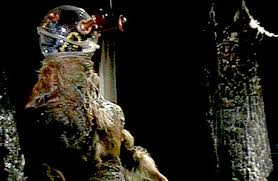
9. The Brain Of Morbius
The odyssey this episode of the classic golden era of the show invited viewers to vicariously participate in was one of gothic body horror-In the regard that it incorporated the strategic scheming of a synthetically manufactured menace that was itself the subject to a manipulative antagonist orchestrating all of the nefarious proceedings from behind the scenes. In the dystopic blend of utterly grotesque machinations reached its culmination with the convicted ambition of Solon's endeavours to grant the bodiless deceased time lord, Morbius, a corporeal form in which to inhabit.
With the assistance of his primitive associate, Condo, he assembled a disarray of various extremities and limbs to construct a physical form in servitude of the malignant villain. Thematics of maniacal devotion and oppressive imposition were in prevalent profusion as the delinquent duo sought to decapitate the head of the fourth Doctor himself in order to conjoin it as the finalising appendage to complete the Frankensteinian form, And the various enterprises that transpired as repercussive consequences of the horrendous transgressions they committed really captured the lightning in a bottle that was the encapsulating customary procedure of beleaguering scientific peril.
An ambient aura of repugnance was created by the heinousness of the eventuations that occurred, and no particular scene or sequence distinguished itself as an outlier-The entire four-part foray accomplished that feat by taking cues from predeceasing original specialists of the subcategorisation of horror of a cognitive and psychological voyage that projected its theoretical design onto the physical and interactive plain. The premeditated resolve of the desired effect of this story was presumably one of creating an intrusive impression to confront viewers with, and it is a cherished product to factor into a Halloween Doctor Who playlist.
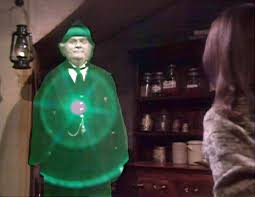
8. Horror Of Fang Rock
There are few sensations that besiege the mental cognisance more inundating than the overbearing feeling of isolation. A lighthouse as good as desolated and secluded away from the embracing proximity of civilisation, afflicted with a vulnerable integrity of its maintaining power supply, receives a group of unscheduled occupants when they arrived via an ashored yacht. And the sinister overtones commenced. The coincidence of a grounded meteor expedited the intermittent power outings, as an obscure being left the first of a plentiful mass of corpses in a disembowelled and devastating condition.
Further developments revealed the creature to be capable of electrocuting victims and transfiguring its form-Accounting for the discovery of a corpse of a familiar companion adopted for an all too brief period that had been presumed alive. The induction of claustrophobia within the urgently assembled crew vicariously imbued itself upon all those witnessing the on-screen events. And, like in most effective horrors, it was the simple desire for the characters such as Harker to merely survive that elicited both the investment and the desperation within all attending the viewing session.
It aired during a period where the prestigious profile of the show and its lead actor had been well established as a behemoth of versatile entertaining delight, and had substantiated their credentials of perfecting the conglomerative synergy between sci-fi and gothic horror; Therefore contrasting it from the acclaim of The Waters Of Mars' accomplishments in response to its tasked duty with an almost converse purpose, but paralleling the consequent reverence as the ramified rewards of its emphatic resplendence. Much of Tom Baker's reign in custody of the TARDIS and screwdriver could be epitomised by his ebullient, animated persona, but the eternal glory the luminary icon was attributed with the enshrinement atop the pinnacle echelons of. A titan at the zenith of Doctor Who hierarchy.
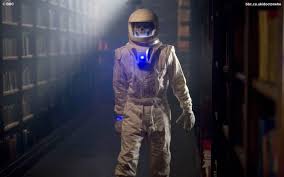
7. Silence In The Library/Forest Of The Dead
There has been an abundance of acknowledgements circulating within spheres of Whovian fanatical discussion with pertinence to the ridiculous suspension of disbelief that especially the modern era obliges fans to submit to, as they descend into the insanity of fearing some of the most banal and trivial aspects of the benignity of the world; Statues, memories, thought processes, shadows-Even breathing! Some of the unorthodox elements of intimidation are more palatably conventional than others, and one of which is the shadows. Of all of the ridiculously formidable and daunting components of the Doctor Who universe, shadows would be less believable than some, but it is not the expectation of pure, unadulterated fear of something that is a fundamental fear of many during childhood-It is the way in which is revitalised that terror.
Shadows that had a behavioural malicious intent. Perplexing initially, but the somewhat innocent curiosity and fascinating intrigue soon transitioned to a discerning and disconcerting realisation of the true dreadfully grim nature of the "swarm of piranhas" as the Doctor himself personified the sentient assailant. It possessed a distinct aura of lethal tenacity, and even the auxiliary plot threads of the mystery as to how River was familiar with the Doctor weren't sufficient enough a digression to distract viewers from the constant awareness of the omnipresent threat that was permanently in the foreground of concerns. The logistical depth that was invested into the production by the crew was more than apparent, and the episode has reached the acclaim of ornately nefarious notoriety that has contradictorily become an element of enthrallment for fans. The universal palatability ensured the real prestige of the show "cast its shadow" over an increasingly broad range of demographics.
The repetitiveness of the bedevilled corpse of Dave as it exclaimed "Hey, who turned out the lights?!" continually after death, accompanied by the supplementary chorus of the library's information technology stating that "Donna Noble has left the library" and "Donna Noble has been saved" as both the shadows and the "empty" archaeological suit converged on the Doctor and his adopted crew's vulnerably restricted position was a fantastic cliffhanger to depart the first part of the double feature upon; And while it had become an abundant trope to use as a pillar for the hallmarks of the show and Steven Moffat's writing to lean upon, it was conveyed in such a refreshing and arcane way that it refused to become fatiguing or surfeiting.
But the heavenly horrors nowhere near ceased with that-There was the continual plot thread of the unnamed little girl who had cognitively conceived the whole library and the mental torment it was for a young child living in the 21st century to be envisioning the tragic events that transpired 3,000 years the latter was an additional element of the delightful torture it was to be inundated with during the viewing experience. Also, the physiological body horror of the horrendously unfortunate and naive Miss Evangelista when she revealed her disfigurement from underneath her veil to Donna(who herself was languishing in the toilsome confusion of her entrapment within the fictional micro-universe added yet another dimensional tier to the transpiration that miraculously didn't over-encumber the load for the episode to bear the weight of. And it would be a blasphemous remission to neglect the poignancy of the resolve, that wasn't a trademark of the horror genre-Instead a typical template for the emotional maturing of the programme. It retained its transcendent complexion among the conrnucopia of pervasive themes of the episode more than proficiently.
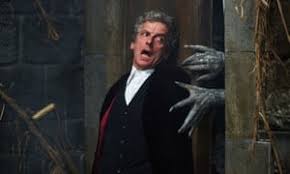
6. Heaven Sent/Hell Bent
Heaven Sent and Hell Bent are not overtly horror at all, and are only eligible for consideration on account of the subtle implementation of the harrowing elements that frequented the duration of the double-barreled blundering escapade of the Doctor as he cautiously navigated his own tailor-made "hell". The parallels that could be drawn with alums of the horror genre however, could potentially be the claustrophobia of the pristine protagonist's incarceration in his personal penitentiary of peril, being resiliently and relentlessly pursued by the veiled beast that mercilessly was intent upon achieving its sole purpose of sentencing the Doctor to his inevitable fate.
Despite the mental torture of the hero through his contrite guilt and grief over mourning Clara, coupled with the physical toll of persistently mouldering through the running of the gauntlet of the agonising stagnating purgatory that was seemingly futile, his persevering defiance could not be faulted. He was "hell-bent" on somehow absconding the atrociously unfavourable odds that were mounted against him, and permeating mythological themes that manifested in his references to the fable by the Brothers Grimm that really analogously represented the forlorn efforts the Doctor participated in.
There were also subtle references to some of the most significant episodes of the entire series, through the assumption that he would inexplicably prevail in his plights, the contradiction of his previous claim of his abandonment of Gallifrey due to boredom as stated during The War Games in the veritable clarification that he ran in fear, and the subtle allusion to his destiny he claimed in The Day of the Doctor; As he was preoccupied with the certainty that he would return to his native planet "the long way round". They were all his orated testimonies in confession-As was the impelled purpose of his solitary confinement in the maze that was, in fact, the confession dial that had been deeply seeded from the beginning of the series.
The episode truly possessed the fascinating detail that could entice fans anew, and satisfy the immersion of the devoted fan base, and encompassed the primitive desperation of the hero as, instead of committing to the overarching grand scheme of the weight of the universe, he merely sought to escape the travesties that were imposed upon him-Echoing others of the same ilk, such as 2013's Evil Dead(only to a more amplified degree of severity and scale). And that was all contained primarily in the first part. Hell Bent comprised of more of the fantastical panache of the show, but occasionally incited unique and subtle incorporations of beings to beware with the cloister wraiths in particular. And in its entirety, the two-part masterpiece served as an adequately astute conclusion to the whole narrative of season nine, but also as a competent and entertaining feature to independently regale audiences. Especially in the foreshadowed conclusion of the Doctor resorting to forget his pain in a dismissal of it as a story; Which is "where memories go when they are forgotten".
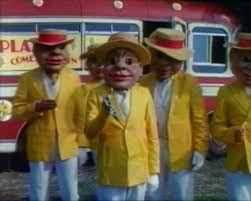
5. Terror Of The Autons
One of the most virtuous commendations that the still formative years of the show(and particularly the illustrious era of Jon Pertwee's third Doctor) was the disastrous dynamic between the ever-eccentric and enigmatic Doctor, and the manipulative machinating mind of the Master, as the two engaged with one another across the acrimonious encounters of their storied past with each other-Featuring the hero's rectifying redemption of the villain's Machiavellian schemes, most prominently amidst the lucid implications of the fractured relations between the pair. One of the most encapsulating of the multitude of affairs was Terror Of The Autons, and it has sustained a longevity of reverential iconography for decades by the merits of the effervescent and proud emblazoning of the incorporation of now deemed "classic" assets of a tale of terror.
Taking cues from other drastically dramatic features of vehement vitriol and opting to influence the unique brand of the ethereal mysticism of Doctor Who upon their portrayal; The return of the Nestene consciousness, coupled with the debut of the Doctor's nemesis, conglomerated in a glorious synthesis of synthetic sensation. The Nestene consciousness had an uncanny proclivity for animating plastic shop mannequins to contort and coerce into committing horrendous crimes, and with the additional alliance with the Master's genius, their abilities were enhanced to expand the horizons of their influence to control even plastic flowers and sitting chairs.
Such a mundane aspect of the world that would typically go disregarded provided the fatal flaw of the naivety of any anticipation of the eventuations, and the copious profusion of all of the affected objects would have proved to be the precise condemning factor to defeat not only a single person, and not only a specific target group, but the entire world-As 20th century Earth was plunged into the depths of the embroilment of urgency and despair. Even with the reassurance of the collaborative efforts of Brigadier Alistair Gordon Lethbridge-Stewart, Captain Mike Yates, and a swarm of other UNIT members, the eternally looming imposition of the presence of the Auton monsters of the Masters' manufacturing proceeded to relentlessly overwhelm.
It was the distillation of the physical maiming of the victims of the dummies and the dispulsion of toxic elements that caused asphyxiation in a pandemic spread, all orchestrated by one mastermind, that caused a terrifying feeling of inescapability , and legitimised the claim that the episode had to its horror appeal.
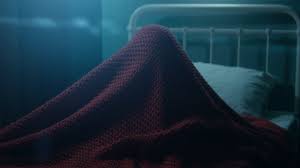
4. Listen
Listen really made a blatant attempt at capitalising on the urban cultural fascination with flagrant exhibitions of mystery and contrivances of shock value. But, whereas many of its contemporaries at the time of release were fatiguing and repugnant with the grating affront of the offensive effect of the disillusioning feature of the elements, Listen incorporated them with finesse and bravado-Fully displaying the adroitness of the writing team that had received scrutinous criticism and come under duress for the inconsistency of the effort invested into their output.
The episode was one of the stellar aspects standing against the typical grain of a mostly underwhelming eighth season in the opinion of many. And with Peter Capaldi's subversively impertinent, yet somehow still charming Doctor being one of the most redeeming aspects of his inaugural stint on the show, his first foray into the realm of horror granted the opportunity to really showcase the twelfth Doctor's courage in the face of adversity. But, as the events transpired, it ultimately eventuated in the realisation that many of the fears of the Doctor and companions Clara and Orson were disproportionate and illogical.
As is standard procedure with Doctor Who, the resolve came courtesy of the luxury of time travel, and it contributed further to the intimate relationship of the Doctor and his adored assistant, and the integrity of their affections for each other was constantly and onerously trialled and challenged throughout the duration of the series. The component of the potential compromisation of the welfare of Danny(Rupert) Pink in the scene where he, Clara and the Doctor blindly imbue faith in the unidentified being not to incur harm upon them with their backs turned created perhaps the highest stakes of tension in at least the whole episode. It was in that same sequence where Capaldi displayed his full capability of remaining brave while in a very existential state of fear in his addressing of the "creature" and inspiration of Rupert in an instance where the hair on the backs of their necks were literally stiff with intimidation.
And the transcendent confluence of genre inter-relativity was implemented via the in-episode continuity of the family heirloom of "Dan the Soldier Man" in a transformation from initial toy status, to be treasured throughout generations of the Pink lineage to be adopted by Orson-Who is a distant descendant of Danny. That was of course entailed by an unexpected appearance of Gallifrey, in another harken back to the Day of the Doctor, whereupon the time lord and the being that had perfected the art of concealment and disguise landed in the now infamous barn on his home planet to visit the protagonist in his childhood. The sinister sounds of the musical scores were liberated to that of a more subdued and dulcet tone within that scene, and audiences were finally allocated some respite from the terror.
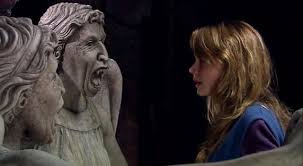
3. Blink
There are definitely compelling cases to be made arguing the most effective benefits of the appropriation when applied sparingly as an accompaniment to bolster the virtues of other genre tropes(in features such as Ghostbusters, The Sixth Sense and Seven for instance). And a prevalent opinion is one that purports that Doctor Who is the most unequivocally competent in that majesty. But the show does relish in its ability to depose that on occasion, and that is precisely what Blink sought to accomplish. For many, it achieved that, and so much more.
The first order of business that it very sagaciously chose to implement was the almost total dissociation of the Doctor himself. The menace of the episode was, of course, the eternally feared, and simultaneously venerated, Weeping Angels. Their incredibly formidable ability to displace victims in the non-linear progression of time, in accordance with their astonishing nature-To resemble humanoid stone effigies that are quantum locked; The beings as old as the universe(or as close to it as possible) possess "the greatest asset that is also their greatest curse" that was summised perfect by the Doctor:
"They are quantum-locked. They don't exist when they're being observed. The moment they are seen by any other living creature, they freeze into rock. No choice. It's a fact of their biology. In the sight of any living thing, they literally turn to stone. And you can't kill a stone. Of course, a stone can't kill you either. But then you turn your head away, then you blink, and oh yes it can. That's why they cover their eyes. They're not weeping. They can't risk looking at each other. Their greatest asset is their greatest curse. They can never be seen. The loneliest creatures in the universe. And I'm sorry. I am very, very sorry. It's up to you now. They are "The only psychopaths in the universe to kill you nicely." With "No mess, no fuss; They just zap you into the past and let you live to death-The rest of your life used up and blown away in the blink of an eye. You die in the past, and in the present they consume the energy of all the days you might have had. All your stolen moments. They're creatures of the abstract. They live off potential energy." Despair was perfectly instilled through those quote exemplifying the very dire circumstance in which they were accosted with. "The Angels have the Phone Box", and the state of affairs could not have been more desperate.
The full tenacity of the Lonely Assassins was articulated in the instructions of the necessary precautions advisably enacted; "They're coming. They're coming for you, but listen, your life could depend on this. Don't blink. Don't even blink. Blink and you're dead. They are fast, faster than you can believe. Don't turn your back, don't look away, and don't blink. Good luck." And the only way the Doctor came to that enlightenment was by finding out the hard way, by being subjected to their malevolent nature himself, when he responded with the explanation "The same way we did. The touch of an angel. Same one, probably, since you ended up in the same year. No, no. No, no, no, don't get up. Time travel without a capsule." when under enquiry at how Billy Shipton had been transported to 1969 from his own curiosity. That, of course, lead to the Angels' custody of the TARDIS, and the consequences would have been devastating, with the implications of catastrophe, as per the Doctor's claim: "The blue box, it's my time machine. There is a world of time energy in there they could feast on forever, but the damage they could do could switch off the sun. You have got to send it back to me."
The episode has gained such a monumental acclaim critically for the impeccable reconcilement of the despicably atrocious circumstances, the trepidation impelled by the circumstances themselves, and the refusal to relinquish the trademark humour and techno-savvy vernacular inherent to the show, via the insistence upon the iconic bestowal of crucial intelligence from the Doctor: "People assume that time is a strict progression of cause to effect, but actually from a non-linear, non-subjective viewpoint, it's more like a big ball of wibbly wobbly, timey-wimey stuff." Nothing left to be desired from Blink.
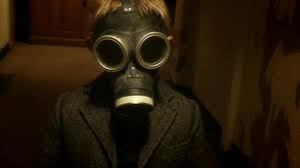
2. The Empty Child/The Doctor Dances
Immediately from the outset, this two-part episode lucidly makes a conscious and blatant effort to perturb the viewers. The inherent charisma of Christopher Ecclestone's excellent ninth Doctor is challenged in unique and macabre ways like it never had been before, and never would be again at every possible intermission. The most pertinent thematic device utilised for the exploitative capitalisation upon the immersive investment of the viewers is the affronting imposition of curiosity. Steven Moffat truly exhibited his full potential as a cerebral and astute writer with his insistence on setting everything slightly off-kilter; Enough to disconcert, but not so over-saturated as to be offensive-Not a procedural dynamic he could replicate so astutely again.
Some of the aforementioned elements of the articulation of the serial could be contradictory of one another and dissonant in the way they are perceived by the audience in any other instance, but there was something obscurely fascinating about the "it" factor it possessed. The ringing of the telephones and the activation of the radios and technology by the unresponsive and estranged entity that seemed to be demented. The ominous omnipresence of the musical scores that only occurred intermittently and briefly. The brazen attempts at humour by the characters, that are juxtaposed by the subtle, but ubiquitously detectable tinge of unassuredness. The all culminate to form a magnificent piece of harrowing, but regaling visual mastery.
Some familiar filming mechanics were employed by the crew in the Empty Child's first-person perspective-Most notably used in Tom Baker's debut, "Robot", and that was just one of the more nuanced components that complimented the overall visionary realisation. The Empty Child took the "Villain Of The Week" formula that had been used to the point of fatigue in the classic series, and completely subverted the expectations of it, by being a compelling mystery, that ultimately was revealed to be something so mundane that it was completely unexpected. And the transcendence of anticipation was what made this episode a thriller.
The entire story, when viewed in a vacuum, was so enticing, that it served to function as the perfect filler episode, but truly was so much more practical. The sub-plot that was inextricably linked to the overall narrative with Nancy's contributions was as immaculate as could be, and the role in which she and her dynamic with the arcane specimen in question was the embellishing finish on an intricately woven story where Ecclestone's incarnation of the time lord was provided depth and gravity without being a stand out feature; His was a Doctor that was characterised by his amazing ability to beguile fans with particular moments of charismatic heroism, but in this episode, he was just as dumbfounded as all of his peers, and didn't implement the solution autonomously-He merely deduced the nature of the situation after struggling with the pursuit of discovering the puzzle for the duration. The "Everybody lives" scene remains a beloved favourite of fans, and it is obvious to see why. A quintessential epitome of an engendering essence of terror with a logical concluding resolve. Highest recommendations to "GO TO YOUR ROOM" and watch as soon as possible.
1. Midnight
There are few catalysts for horrific impulses of terror than the demonic danger of the entity that incurred the occupants of the Crusader Tours minibus as it traversed the surface of the titular planet. Even with the absence of the incredibly reliable companion by virtue of her fidelity, Donna, all seemed to be in order and accounted for(with the Doctor inviting viewers on a casual escapade of privilege by exclaiming "Allons-y!"). All seemed to be in order-Initially. With the Doctor's declaration that they passengers ought to have interacted with one another upon the disablement of the onboard entertainment system, the eventual transpirations were made inevitably detectable.
The devil's advocacy of "Taking a big space truck with a bunch of strangers across a diamond planet called Midnight? What could possibly go wrong?" really ensured the fate of spelt doom of the vessel when viewed with a meta introspective, and the suddenly abrupt break of it in contradiction of the regiment of unflappable dependability of the schedule stirred the beginning of an exponentially intensifying tension. After investigation on the part of the Doctor, he sought the reassurance of his fellow passengers in his visit to the cockpit, but the external knocking on the minibus by a being that should have been dead due to the filtration of ex-tonic rays within the planet's atmosphere, preceding the imitation of the responsive knocking from the Doctor and co. exacerbated the atmosphere of the transport itself.
The cast iron doors should have rendered the minibus impenetrable by all means, but the menace shook the craft, and the real insanity began. Imitation is irritating at best, but it had never really been conceived as an imposing threat in the same way that Midnight represented the erudition of the entity that behaved parasitically-Latching onto Skye Sylvestry at first, and controlling the ominous, steady turn of her head. The curiosity at the immaculately accurate repetition of even the convoluted phrasing of the value of Pi inadvertently lead to the simultaneous mimicry, and the insular focus of the sole element of the episode on the very fundamental feature on which it was predicated upon dictated the distillation of terror that Midnight was prided upon.
Psychological methods of varying responses of how to cope with an unknown threat of transitioning from Skye to the most hopeful salvation for all of the occupants were what made the investment in the characters compelling, as good people considered electing to acts of murder. The more oppugnant aspects of the human mind were explored and exposed, and the undertones of the piercing falsetto shrill of violins provided the subtly resonant soundtrack to the desperation and urgency impelled by the situation. An outright blatant horror, that was traumatic for all of those involved, and the impotence of the Doctor to affect any benevolence was what sealed the horrific intimidation factor. Doctor Who. Horror. Glaring dispulsion of wrath. Nothing could be more thrilling and harrowing.
